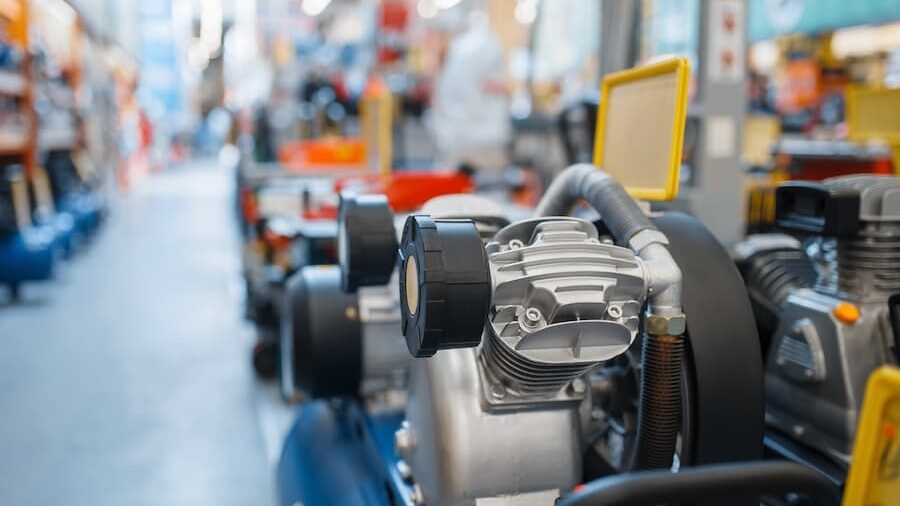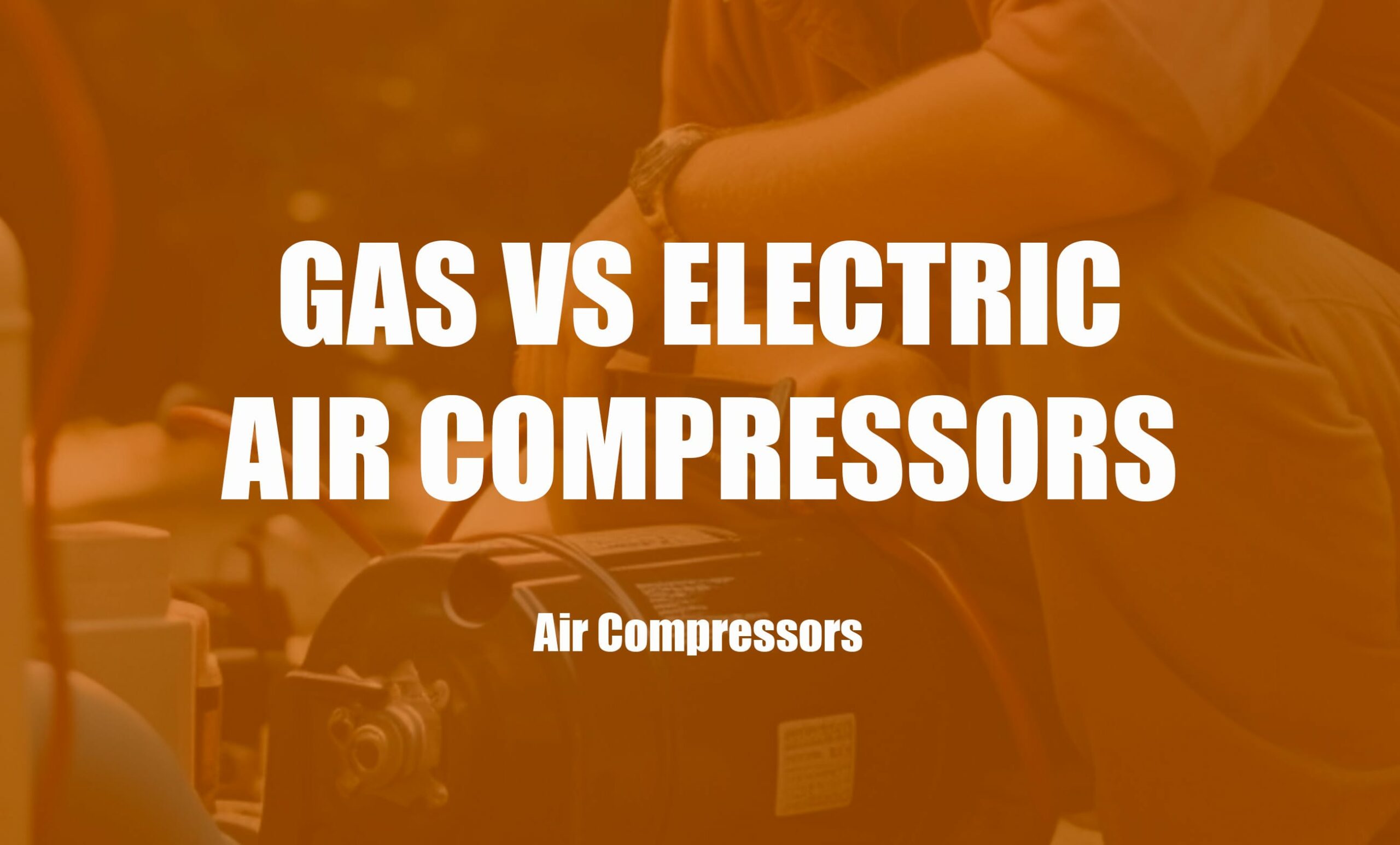When it comes to air compressors there’s something that you and I will agree: there’s a lot of confusion and lousy brands trying to take advantage.
When we compare gas vs electric air compressors, we see a perfect example of this confusion. The market is riddled with misinformation and brands attempting to sell you air compressors without taking your needs into account.
This is why I decided to dedicate a few days of my week to composing an in-depth article about the differences between gas and electric air compressors, so you can make an informed decision.
Gas vs Electric Air Compressor
We’re going to learn about the differences between gas and electric air compressors by focusing on the following six factors:
Power Source
The most obvious distinction is that gas and electric air compressors use entirely different power sources.
Gas air compressors are powered by natural gas.
Natural gas is a clean-burning, low-cost fuel source that is used in a variety of air compressors because it is both inexpensive and readily available.
Electric air compressors, on the other hand, are connected to the nearest power outlet and run on electricity. This makes them ideal for indoor use but somewhat inconvenient if there isn’t a power outlet nearby.
Portability
Portability is a big concern for some workers. We aren’t all lucky to always work in the same place, some of use have to constantly move around.
In this situation, a portable air compressor becomes crucial.
Electric air compressors are ideal for this because they are made of lighter materials and do not require fuel tanks because they are powered by electricity rather than natural gas.
As a result, electric air compressors are lighter and more compact, making them very portable.
Gas air compressors are known for having heavier internal components and fuel tanks, which add weight and bulk to their overall structures.
That’s where you’ll find gas air compressors weighing 150 to 200 pounds and being difficult to move.
Price
Wanna get solid advice? Make sure not to waste your hard earned money! Boy did I need to hear that a few years ago…
But how can you do this?
Making sure you invest in a high-quality yet affordable air compressor is a good place to start.
Gas-powered air compressors are typically more expensive upfront, with prices starting around $1,000. As a result, they are slightly more expensive than electric air compressors.
However, natural gas is significantly cheaper than electricity (around 50% cheaper), so there’s a good chance you’ll recoup your investment in electricity savings if you plan to use your air compressor frequently.
Electric air compressors are typically less expensive (around $500) than their gas-counterparts.
However, they are powered by electricity, which means that if you plan on using the electric air compressor frequently, you should budget for hundreds of dollars per month.
Noise Levels
Hate working next to a noisy air compressor? Join the club!
Sadly, most air compressors out there are annoyingly noisy, especially gas air compressors as they are made with combustion engines that, even though they are very powerful, make a lot of noise when operating.
Electric air compressors, on the other hand, are much more quiet as they are made with non-combusting engine that only take electricity to run. This makes them much quieter and perfect to be run indoors.
So, if you want to avoid damaging your hearing and you don’t need the power that a gas air compressor brings to the table, then getting an electrical air compressor should be your best bet.
Context
The environment in which you use your air compressor is also important.
If you intend to use the air compressor near a power outlet, an electric air compressor should be more convenient.
However, if you intend to use it outside where there aren’t any nearby power outlets, a gas air compressor would be more convenient because you’d only need to fill it with natural gas once before running it.
Efficiency
Another important aspect of air compressors is their efficiency. Using electricity to power an air compressor is not the same as using natural gas.
By far, gas air compressors are more efficient than electric air compressors.
This is because natural gas is not only cheaper to produce but also has a higher energy output per unit. That is, natural gas will produce more energy than electricity.
Furthermore, when compared to other fuels, natural gas emits 45% less carbon dioxide than coal and 30% less carbon dioxide than coal.
So, if you want to spend your money on an air compressor that is both environmentally friendly and efficient, a gas air compressor should be one option.
What are the Benefits of Gas Air Compressors?
Here’re some of the most influential benefits that gas-powered air compressors bring to the table:
Don’t need power outlet
Think of working in the middle of nowhere: do you have a power outlet close by? No… right?
If you frequently find yourself needing to run your air tools without a power outlet nearby, investing in a gas air compressor is a good idea.
Gas air compressors are powered by natural gas which can be bought on almost any gas station. This allows users to work on remote locations with their air tools when there are no nearby outlets (e.g. construction workers).
Designed for heavy tasks
Sometimes you just have to work on difficult tasks.
Whether you’re running professional grade air tools or inflating truck tires, you’ll need an air compressor capable of producing a significant amount of air pressure.
That is where gas air compressors excel.
Gas air compressors can run professional grade air tools due to their particularly powerful combustion engines that provide higher levels of air pressure, which is ideal if you frequently work on heavy applications.
Superior efficiency
Some people are dead set on putting their money into efficient tools with the best price-to-value ratio.
If that describes you and you’re looking for an air compressor, you’ll appreciate the efficiency that a gas air compressor provides because it’s powered by natural gas, which is less expensive, cleaner burning, and provides more energy per unit than electricity.
As a result, when it comes to air compressor power sources, these air compressors are the most efficient options.
What are the Benefits of Electric Air Compressors?

There are some clear benefits related to electric air compressors. Let’s discuss them:
Free of fumes
If you want to be certain that your air compressor will run safely without endangering you or your family, you should consider purchasing an electric air compressor.
These compressors are powered by non-combusting engines that do not require fuel to operate and instead rely on electricity. This means that when they are running, they will not emit any toxic fumes.
That way, you can use the air compressor with confidence that working near it will not be hazardous to you, your colleagues, or your family.
Quietness
Quietness is another big advantage of electric air compressors.
As they don’t have combustion engine, they are able to run making substantially less noise than gas air compressors.
So, if you’re the kind of guy who hate noise and you want to get an air compressor that’s quiet but also powerful enough to run your pneumatic tools, you’ll love an electric air compressor.
Easy to move around
Moving air compressors is something we all have to do at some point. Electric air compressors have a significant advantage over their gas-powered counterparts in this context.
Because electric air compressors do not have gas tanks, they are compact and lightweight, making them easy to transport.
This is critical for workers who are constantly on the move, as they will require a portable air compressor.
No fuel risk
There is no getting around the fact that natural gas is hazardous. You don’t want to be near a gas-powered air compressor no matter how good it is; if something bad happens or a malfunction occurs.
Electrical air compressors, on the other hand, are much safer to operate because they only require electrical currents to function.
This allows them to avoid emitting gas (because they aren’t powered by combustion engines) and carry zero fuel, which is critical for allowing owners to use air compressors without fear of anything dangerous happening.
Table of Contents
| Gas Air Compressors | Electric Air Compressors | |
| Power Source | Gas powered | Powered by electricity |
| Portability | More bulky and heavy | Lightweight |
| Price | More upfront, but gas is cheaper | Less upfront, but electricity is more expensive |
| Noise Levels | Noisier | More quiet |
| Efficiency | More efficient | Less efficient |
Frequently Asked Questions
Here are some of the most frequent questions asked about both gas and electric air compressors. Let’s try to answer them all:
How long do electric air compressors last?
Electric air compressors are well-known for their durability. In fact, in some cases, they can last up to ten years.
This is due to the fact that they are made with electric components that rarely require maintenance and do not corrode easily.
This is critical because most air compressors that require maintenance are damaged by corrosion because owners forget to add oil.
Can you run an electric air compressor indoors?
Yes, you can run an electric air compressor indoors safely. You’ll just have to make sure that the area is properly ventilated and that the air compressor is manufactured by a reliable brand.
This is key to make sure that the air compressor won’t emit dangerous combustion gases or malfunction putting you and anyone who’s close in danger.
Can you leave a compressor on all night?
The answer is: it depends. You can certainly run an air compressor all night, but you must take some precautions, such as:
- If you use a gas air compressor, make sure it is located in a well-ventilated area so that all emission gases do not remain indoors.
- Place the air compressor far enough away (more than 20 feet) that the noise and gases do not disturb anyone.
- Check that the tank is not running on empty. This will keep it from breaking down.
- Verify that the air compressor is properly maintained so that it functions properly.
Electric air compressors have a distinct advantage over gas air compressors in that they do not need to be filled with gas in the middle of the night; instead, they are simply plugged into a power outlet and left running.
